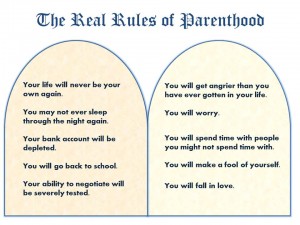 I bet you didn’t know that there are “real” rules regarding parenthood.
I bet you didn’t know that there are “real” rules regarding parenthood.
They are not published in any book; they are not the ones you read in magazine articles; they are not the ones touted by well-educated experts.
These are rules that cannot be learned or understood until one becomes a parent.
I will try for the first time to write them down. Surely there will be more that could be added, but these are the commandments – the “real” rules.
-
Your life will never be your own again.
From the first twinge of labor pains (or adoption pains) you have signed over your free time, your energy and your ability to think in a completely focused manner. A terrific psychologist and parenting educator I know calls it “mother brain”.
-
You may not ever sleep through the night again.
Yes, I’ve heard folk tales of children who come home from the hospital and sleep through the night but who knows where those urban legends get started; probably by people who developed a severe case of mother brain. (Count yourself lucky if you got a baby who did sleep through the night.)
But oh those teenage years – you may find yourself up in the middle of the night even if you get your sleep when your kids were little.
-
Your bank account will be depleted.
A new baby needs a lot; a package of diapers every two days, baby-wipes (constantly), a new wardrobe every three weeks due to freakish growth patterns, and any baby gym memberships you can afford.
And it doesn’t stop there. The next 18 plus years will be filled with clothes, activities, the latest technology, college tuition, and the list goes on.
-
You will involuntarily repeat kindergarten through 12th grade.
And you will work hard; there will be projects starting from day one.
- You may feel guilty if you don’t help because all the other parents are competing for the best project award.
- Or you may feel guilty for not helping enough!
- Or you may feel guilty that you did too much and deprived your child of the opportunity to accomplish it on his own!
Finding the right balance is a huge challenge. Be strong; use the internet; ask the neighbors for help.
- Your ability to negotiate will be severely tested.
This kicks in as soon as your child notices he or she is a person (at about 6 months). You are strongly encouraged to take a conflict resolution class. Your old methods of communication are now obsolete.
It’s a whole new world of give and take – who knew that it could be so hard to reason with a pint-sized person. You will never come out ahead without some basic training: take classes, read books, find support.
-
You will get angrier than you have ever gotten in your life.
Take an anger management course. See No. 5.
-
You will worry.
Enough said.
-
You will spend time with people you might not spend time with.
These are the parents of your children’s friends. Who knows, maybe you will develop new friends too, and if not, try to find their good points; the main one being that they have supplied your child with a friend.
-
You will make a fool of yourself.
Perhaps you have to do the chicken dance at your child’s school talent show. You do it with a chicken mask on, and you will do it with grace and aplomb.
-
You will fall in love and your newfound feelings of love will rise to an incomparable height.
There is really no word to describe the feelings you have for your children. Just be aware that it will be all-consuming – and that’s a good thing. You have the awesome responsibility and the magnificent opportunity to develop a lifelong, loving and supportive relationship.
So, there you go. The real rules of parenthood. I’d write more but I have to practice my multiplication tables – we’re having a test tomorrow.
____________________________________________________________
For more information about parenting, check out the following books. Purchasing books from our website through Amazon.com supports the work we do to help parents do the best job they can to raise their children.
<recommended books about parenting
<all our recommended parenting books
____________________________________________________________
<additional articles that Focus on Parents
<Library of Articles topic page




